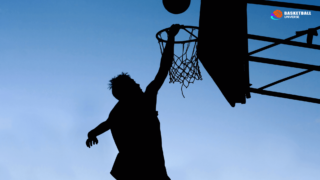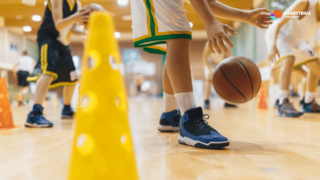
The question of whether it’s too late to start basketball at 16 is a common one that often pops up in the minds of aspiring hoopers eager to step on the court. While there are undeniable advantages to starting young, the beauty of basketball is that it is more about skills, heart, and passion than just physical ability. So, whether it’s your dream to perform the perfect crossover or to nail that game-winning shot, our latest blog post aims to encourage, inspire, and educate you on how, indeed, at 16, you are still in a position to make a mark on the basketball court!
Is It Too Late to Start Basketball at 16?
No, it is not too late to start basketball at 16. While starting at a young age has its advantages, success in basketball depends on skills, passion, and dedication. Hard work and persistence can lead to improvement at any age, so starting at 16 still offers ample opportunity for growth and potential success on the court.
Understanding the Fundamentals at Any Age
Basketball is a sport that emphasizes the importance of fundamentals, which can be learned and improved upon at any age. Let’s explore some of the core principles that you can focus on, starting from the age of 16 or beyond, to build a solid foundation for your basketball journey.
Mastering Basic Skills
Developing a strong skillset is crucial to success on the court. The basics include dribbling, passing, shooting, defense, and rebounding. Even if you’re starting at 16, it’s never too late to hone these skills with practice and dedication. Regularly engage in drills and practice sessions to see steady improvement over time.
Fitness and Conditioning
Basketball is a physically demanding sport, so improving your fitness and endurance is essential for success. Begin a workout routine comprised of stamina-building exercises like running, sprinting, and high-intensity interval training (HIIT). To enhance strength and stability, incorporate weight lifting and core workouts into your regimen.
Teamwork and Communication
Being a team player is crucial in basketball, where effective communication can lead to game-winning plays. Emphasize efforts to bolster camaraderie and cooperation among your teammates by participating in local leagues, pick-up games, or team practice sessions.
Finding Role Models and Inspiration
One of the most encouraging aspects of basketball lies in the stories of notable players who began their basketball journey at a later age. Studying the paths of these late bloomers can provide invaluable inspiration and motivation as you embark on your own basketball adventure.
Dennis Rodman
Famous for his tenacious rebounding and fiery defense, Dennis Rodman didn’t start playing organized basketball until the age of 21. Despite his late start, Rodman went on to become an NBA champion and Hall of Famer, proving that hard work and dedication can lead to greatness.
Tim Duncan
Before joining the basketball world, Tim Duncan was an accomplished swimmer. It wasn’t until the age of 14 that Duncan decided to pursue basketball seriously. With his remarkable work ethic, he became one of the most dominant power forwards in NBA history and a five-time champion.
Identifying Your Growth Opportunities
Growth on the basketball court isn’t limited to physical aspects; mental and emotional growth plays a significant role in developing as a player. Here are some critical domains to focus on if you’re starting at age 16 or beyond.
Embracing the Learning Curve
As a late starter, you may experience challenges and setbacks that may feel discouraging. Embrace the learning curve with patience and perseverance, recognizing that success comes from constant effort and self-improvement.
Adopting a Growth Mindset
When starting basketball at a later age, it’s crucial to maintain a growth mindset. It’s the belief that intelligence and abilities can develop and improve through hard work, effort, and resilience. Embrace challenges, learn from setbacks and believe in your ability to improve relentlessly.
Seeking Expert Guidance
To expedite your growth, seek guidance from experienced players, trainers, or coaches. These experts can provide invaluable advice and support to help you hone your skills and avoid potential pitfalls in your basketball journey. Surround yourself with mentors and peers who share your passion for the game.
Options for Competitive Basketball at 16
Despite a late start, numerous pathways exist for young players seeking a competitive basketball experience. Here are some options to gain vital exposure and experience on the court.
High School Basketball
At 16, you might still be eligible to join your high school basketball team. Approach your school’s coach for tryout information, requirements, and team expectations. High school basketball can be a fantastic opportunity to learn the intricacies of the game, develop teamwork skills, and gain valuable experience in a competitive environment.
Amateur Athletic Union (AAU)
The Amateur Athletic Union (AAU) is an excellent platform for talented players to showcase their skills in front of coaches, trainers, and scouts. Joining an AAU team can help you gain experience in organized games and assist in your overall growth as a player.
Local Leagues and Recreational Teams
Local recreational leagues and teams offer the chance to experience a more relaxed and supportive atmosphere, making them perfect for beginners. These leagues are a great way to gain valuable court time, build confidence, and practice the skills you’ve been honing during practice sessions.
Education and Career Pathways in Basketball
Beyond playing basketball, various education and career opportunities can benefit from your basketball knowledge and passion. Let’s delve into some exciting career options related to the world of basketball.
Coaching and Training
Many individuals find immense satisfaction in sharing their knowledge and passion for basketball by becoming coaches or trainers. These roles provide the opportunity to develop players’ skills and make a lasting impact through guidance and mentorship.
Sports Management and Administration
Roles in sports management and administration involve working behind the scenes in leagues and organizations, facilitating the smooth running of basketball programs and events. These roles cater to those wishing to support the growth and promotion of the sport without necessarily competing themselves.
Sports Journalism and Broadcasting
If you possess a gift for storytelling or have a knack for analyzing games, consider a career in sports journalism or broadcasting. From play-by-play commentating to writing articles about the sport, there are various ways to share your basketball expertise with a broader audience.
Embrace the Power of Persistence
Starting basketball at age 16, or any age for that matter, is all about embracing challenges, staying committed, and remaining passionate about the game. Focus on your personal growth and embrace learning opportunities at every step. Remember, the basketball journey may not always come easy, but with unwavering passion and determination, you are bound to leave your mark on the court.
Navigating Different Levels of Basketball
As an aspiring basketball player starting at 16, it’s essential to understand the various levels of basketball so you can set realistic expectations and goals for your journey. Knowing the lay of the land can provide valuable insights and help you make informed decisions about your basketball future.
Recreational Basketball
Recreational basketball is an ideal starting point for players of all ages interested in enjoying the benefits of exercise and camaraderie on the court. Recreational leagues and pickup games offer a relaxed playing environment where you can practice and hone your skills.
School and College Basketball
Joining your school or college basketball team can be an excellent opportunity for young players to gain competitive experience and build a strong sporting foundation. These teams typically participate in regional and national competitions, providing solid exposure to players and, potentially, scholarship opportunities or assistance with college tuition costs.
Semi-Professional and Professional Basketball
For those aspiring to reach the highest levels of the sport, semi-professional and professional basketball leagues offer the chance to compete at an elite level. While reaching this level can be challenging for late starters, it’s not impossible with unwavering dedication and determination. Players must exhibit exceptional skill, talent, and work ethic to secure a spot on a team in these rigorous, competitive leagues.
Maximizing Your Potential Through Technology
In today’s digital age, several tools and resources can help late starters like you maximize your potential on the basketball court. Make use of these technological innovations to complement your traditional training and supercharge your improvement.
Online Coaching and Training
Several platforms offer online coaching and training guided by experienced players and instructors. These resources can help you learn and practice essential skills, tactics, and strategies from the comfort of your own home or local court.
Fitness Trackers and Wearable Technology
Stay in control of your training progress by using fitness trackers and wearable technology to monitor your physical activity and stats closely. Use these insights to optimize your workouts, identify areas for improvement, and prevent potential injuries by spotting imbalances and weaknesses in your performance.
Mobile Apps and Websites
Digital platforms such as mobile apps and websites offer a treasure trove of knowledge, helpful tips, drills, and exercises for aspiring basketball players. Use these resources to supplement your training and further develop your skills and understanding of the game.
Embracing the Physical and Mental Benefits
Basketball offers a multitude of physical, mental, and social benefits for players of all ages, making it an excellent choice for anyone who wants to enjoy an active lifestyle while fostering meaningful connections with teammates and fellow enthusiasts.
Physical Benefits
Basketball helps improve cardiovascular fitness, muscle strength, and endurance by engaging various muscle groups during gameplay. The intensive activity also aids in weight management, agility, balance, and hand-eye coordination, all of which translate to better overall health.
Mental Benefits
Playing basketball fosters cognitive development by sharpening decision-making, problem-solving, and concentration skills. The sport also promotes stress relief, emotional well-being, and enhanced self-esteem, as success on the court can inspire a sense of pride and accomplishment.
Social Benefits
Basketball can help strengthen interpersonal connections through teamwork, cooperation, and communication. By working towards a common goal and bonding with teammates, you can expand your social circle and create lasting friendships on and off the court.
Frequently Asked Questions
We’ve compiled a list of frequently asked questions that are semantically related to starting basketball at the age of 16, touching upon various topics of interest. Browse through these essential questions and answers to delve deeper into your understanding of the sport and boost your confidence as you embark on your basketball journey.
1. How can I learn basketball fundamentals?
The best way to learn basketball fundamentals is through practice, online tutorials, attending camps or clinics, and seeking guidance from experienced players, coaches, or trainers. Regularly practicing and mastering each skill will significantly improve your overall ability on the court.
2. Can I still make my high school basketball team if I start at 16?
Yes, it is possible to make your high school basketball team if you start at 16. Persistence and dedication to improving your fundamental skills and fitness levels can greatly enhance your chances of making the team.
3. What should I focus on if I’m starting basketball late?
Focus on mastering the fundamentals, improving your fitness and conditioning, and developing teamwork and communication skills. Embrace the learning curve, adopt a growth mindset, and seek guidance from experienced players and coaches to expedite your growth.
4. Are there professional basketball players who started late?
Yes, several professional basketball players started their journey later in life, such as Dennis Rodman and Tim Duncan. These players’ success stories offer inspiration and motivation for late starters like you to pursue your passion for the sport.
5. How can I improve my ball-handling skills?
Practice ball-handling drills focusing on agility, finger strength, and coordination. Incorporate dribbling, control, and speed exercises into your routine while experimenting with variations to become more comfortable with handling the basketball.
6. Can I get a basketball scholarship if I start at 16?
While the chances may be slimmer than those who start earlier, it’s still possible to obtain a basketball scholarship if you demonstrate exceptional skill, talent, and a remarkable work ethic. Focus on improving consistently and excelling on the court, and consider showcasing your abilities in high school and AAU games to attract scouts and coaches.
7. What are some essential drills for beginners?
Some essential drills for beginners include stationary dribbling, layup drills, shooting drills, basic passing drills, and defensive drills. These drills are instrumental in building a strong foundation of fundamental basketball skills.
8. How do I choose the right basketball shoes?
Consider factors like cushioning, support, fit, durability, and personal style when choosing basketball shoes. Prioritize comfort and function, and opt for a shoe that caters to your specific needs as a player, whether you’re a guard, forward, or center.
9. How long does it take to become good at basketball?
The timeline to become good at basketball largely depends on your consistency, dedication, and effort, as well as your natural aptitude for the sport. Remember, improvement is a gradual process, and success will likely come to those who stay committed and practice regularly.
10. How can I improve my basketball IQ?
To improve your basketball IQ, watch games and analyze them, learn from experienced players and coaches, study plays and tactics, and participate in organized games. As you deepen your understanding of the game, your basketball IQ will naturally increase.
11. How can I maximize my vertical leap?
Maximize your vertical leap by incorporating plyometric training, strength training, and flexibility exercises into your routine. Focus on strengthening leg muscles, improving explosive power, and enhancing overall lower body function to achieve desired results.
12. How can I become a better scorer?
Become a better scorer by working on your shooting technique, expanding your scoring options (such as layups, jump shots, and three-pointers), improving your off-the-ball movement, and developing a strong basketball IQ to identify scoring opportunities.
13. How can I improve my defensive capabilities?
Improve your defensive capabilities by enhancing agility, footwork, and lateral quickness. Practice defensive drills like slides, close-outs, and defensive stances to boost overall defensive performance. Additionally, study opponents’ tendencies and develop a strong positional awareness to anticipate plays on the defensive end.
Featured Posts
- No pillar pages found.





